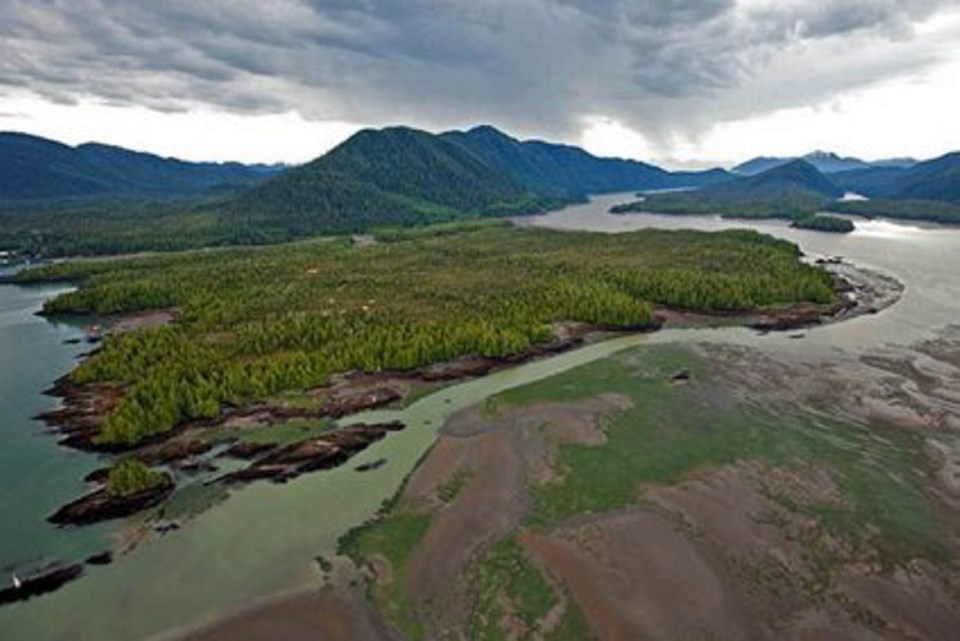 Premier Christy Clark on Monday took a much harder line against the NDP and others who “say no to everything.”
Premier Christy Clark on Monday took a much harder line against the NDP and others who “say no to everything.”
It’s a familiar line of attack for Clark against the opposition. But in the case she was discussing — pronounced antipathy to the siting of a proposed liquefied natural gas plan near Prince Rupert — it includes a number of First Nations hereditary chiefs. Her government has been trying to stay on good terms with First Nations on a host of issues, but when it comes to resource development, she looks ready to talk tougher now than in the past.
She was reacting to a declaration signed by some hereditary chiefs and hundreds of others — including three NDP MLAs — that would forbid development of Pacific NorthWest LNG’s proposed plant south of Prince Rupert because it impinges on salmon habitat.
“I am most concerned about the opponents … signing on to say they don’t want anything to happen up there,” said Clark. “It’s the world being divided into two. The people who will say no to everything, and people who want to find a way to get to yes, who recognize that’s how you create jobs.”
She got some support later from five elected Tsimshian Nation chiefs who said those who signed the declaration as hereditary chiefs had no mandate. They were “extremely disappointed” the NDP politicians signed on without consulting them, since they’ve been studying LNG for years.
The declaration arose from a meeting devoted to protecting the Skeena River’s salmon runs. The plant’s tidewater siting is a sticking point in the federal environmental-approval process now underway.
The Department of Fisheries and Oceans recently told that approval panel that “no significant effects” are expected from a trestle that runs over that habitat.
Clark said the federal scientists with DFO believe the impacts will be mitigable and the fish will be supported.
“When those scientists say the process can go ahead, I’m not sure what science the forces of no bring together up there, except that it’s not really about the science, it’s not really about the fish, it’s just about trying to say no,” she said. “It’s about fear of change, it’s about fear of the future.”
The declaration is also a bit of a departure for the NDP, since it amounts to a definitive no on at least one LNG project. It’s the most forthright pronouncement on the issue to date by anyone in the party. The NDP has been expressing lukewarm support for the potential new industry for the past several years. But it has voted against measures introduced to make it happen and been critical of how the government has handled the long negotiations over the projects.
The MLAs — Jennifer Rice (North Coast), Doug Donaldson (Stikine) and Robin Austin (Skeena) — represent much of the B.C. coast, including most of the major proposed LNG sites. They signed up, along with NDP MP Nathan Cullen. The unequivocal rejection of the project is on grounds that could easily apply to other sites, since lots of salmon streams are in play.
The declaration would forbid the plant because the site is “protected for all time, as a refuge for wild salmon and marine resources … to be held in trust for all future generations,” says the declaration.
In addition to signing the declaration, the trio of MLAs said the proposed facility “poses an unacceptable risk to the Flora Bank habitat that is an irreplaceable link in the Skeena River salmon ecosystem.”
Bruce Ralston, the NDP’s critic on the LNG file, said people have been “mystified” for years about why the particular site was chosen, because of its sensitivity.
The Skeena is one of the great salmon rivers and there’s a legitimate debate about what impact an LNG plant would have, he said.
Ralston said the NDP does support the creation of an LNG industry, but it’s conditional on First Nations and environmental concerns that haven’t been alleviated by PNW LNG.
The three MLAs’ decision “doesn’t detract from our overall support for the creation of an LNG industry.”
There are about 20 projects in the works. “Some we support and some we don’t,” Ralston said.
First Nations look as fractured on LNG at this point as the B.C. Liberals and NDP are. But some company has to commit to actually building a plant before the various pronouncements amount to much.



